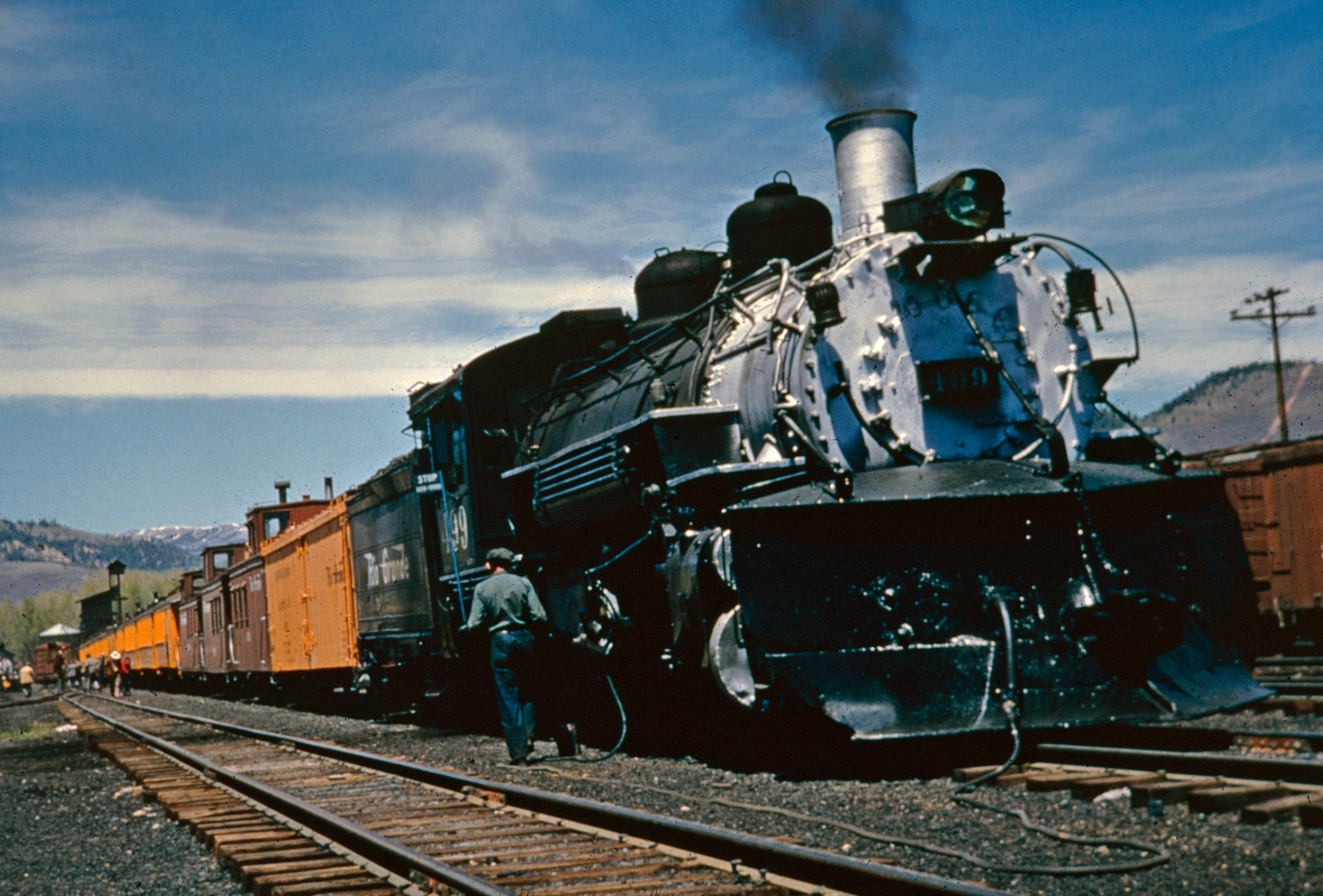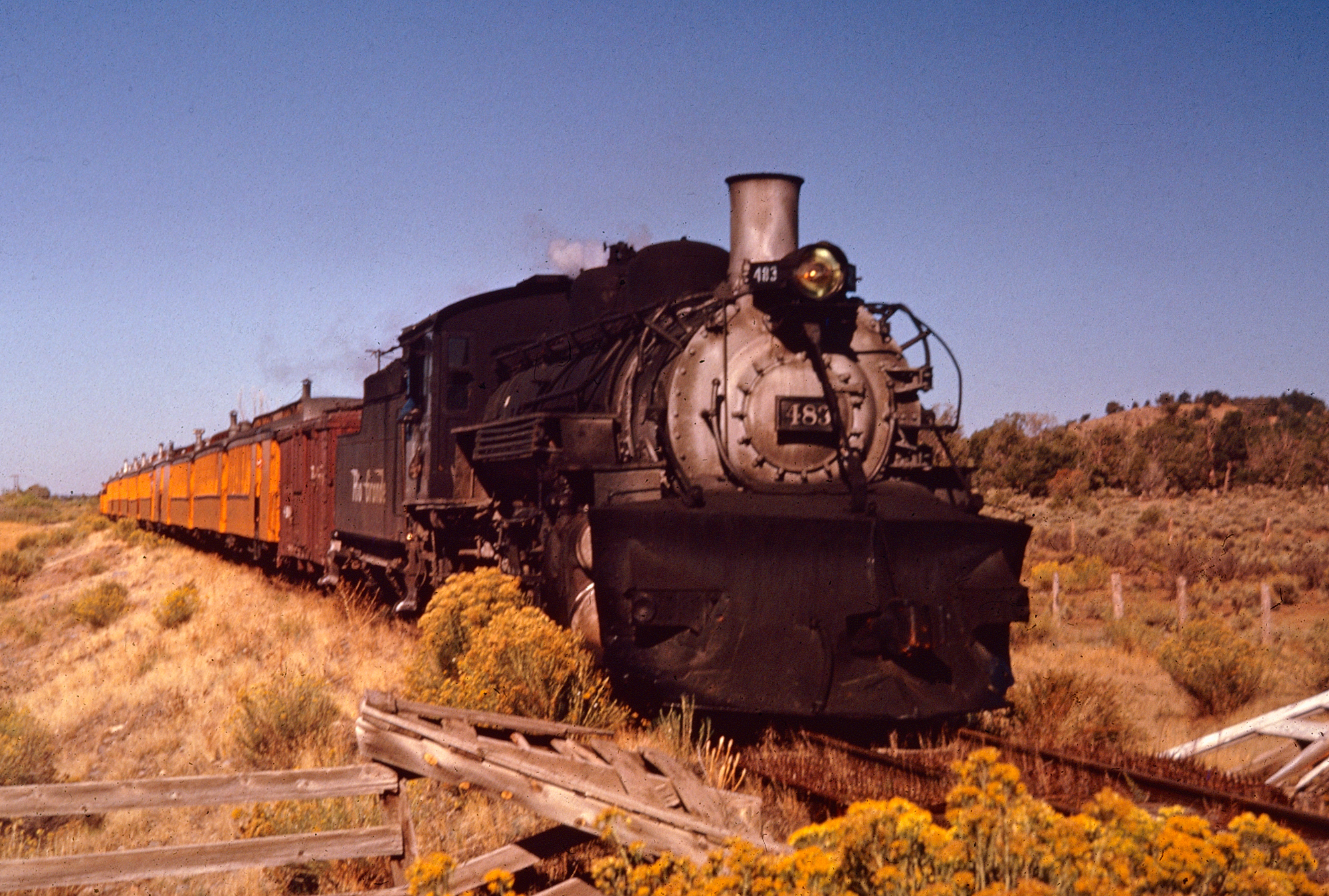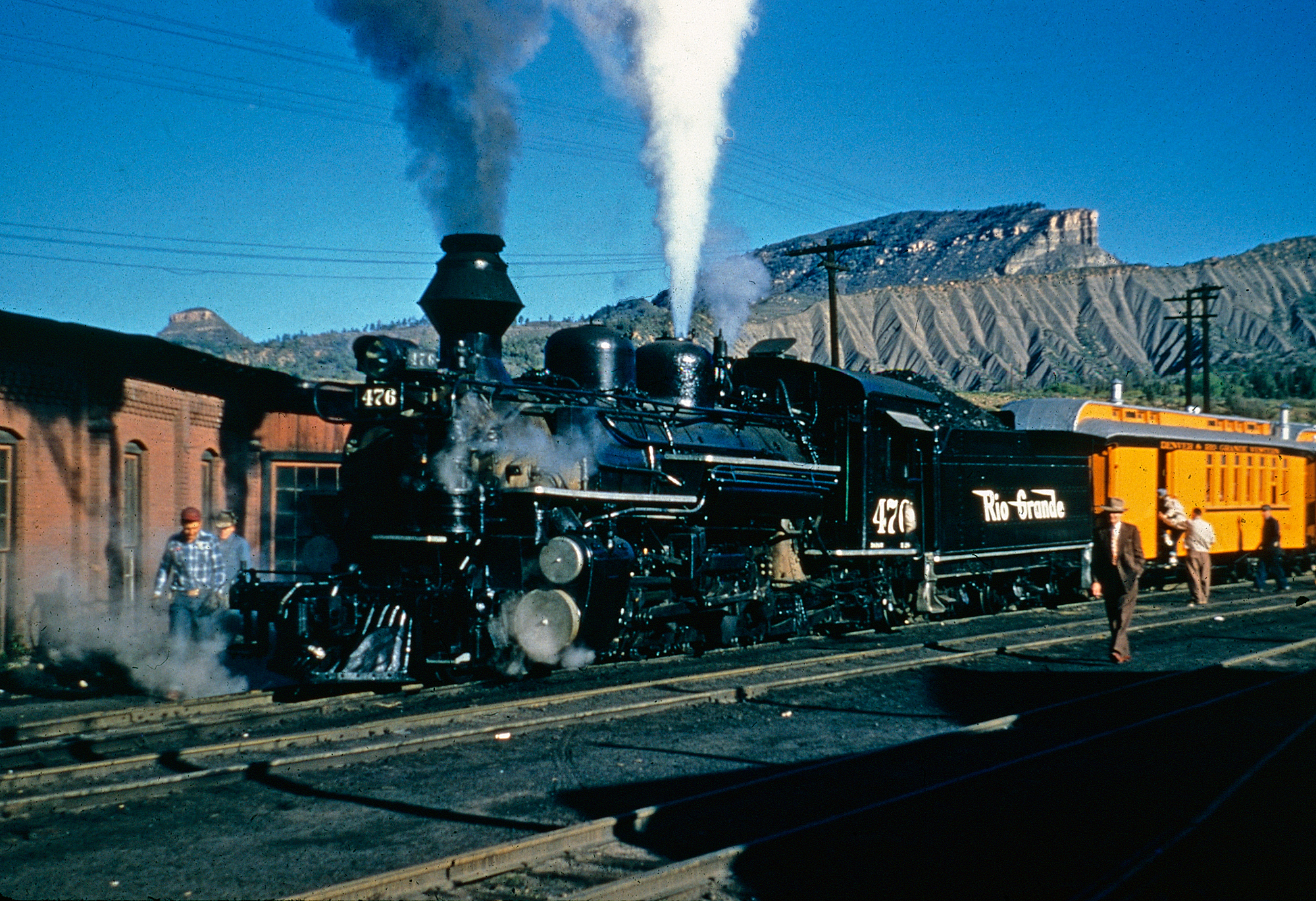GE "ES44DC" Locomotives: Data, Specs, Roster
Last revised: December 31, 2024
By: Adam Burns
The ES44DC closed out General Electric's direct current traction line, spanning back to its first cataloged model, the U25B of 1959.
With the phenomenal success of its AC4400CW of the 1990s, the industry acquired an ever-increasing number of AC traction locomotives.
Alternating-current traction motors were a breakthrough in technological development. It was much easier to maintain and more reliable, all the while offering phenomenal pulling power making it ideal in heavy drag service.
However, not every Class I was sold on this technology; holdouts like Norfolk Southern, Canadian National, CSX Transportation, and even Burlington Northern Santa Fe continued to DC traction locomotives into the Evolution Series era.
The carbody of the ES44AC and ES44DC is virtually identical; the only noticeable external difference is the latter's lack of an AC circuitry box along the left side walkway.
Sales for DC traction locomotives slowly dried up by the late 2000s with the final order being 35 units acquired by Canadian National in late 2010. Today, all new road-switchers produced by GE-successor Wabtec Freight, feature AC traction.
Photos
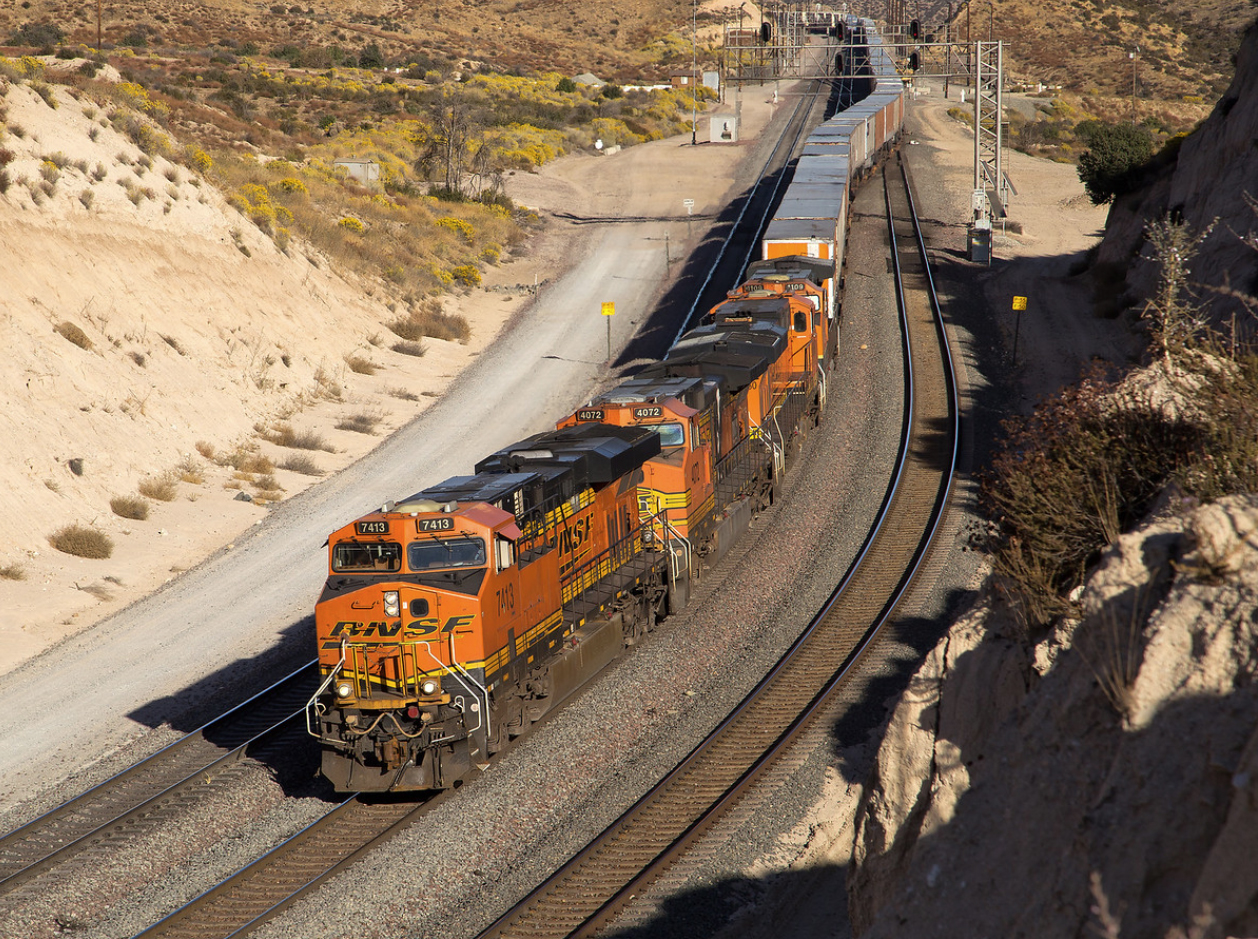 BNSF ES44DC #7413 leads a westbound intermodal freight down the 2.2% grade of Cajon Pass. Loyd Lowry photo.
BNSF ES44DC #7413 leads a westbound intermodal freight down the 2.2% grade of Cajon Pass. Loyd Lowry photo.Background
With the release of the AC4400CW in 1993, General Electric forever changed how main line locomotives were built.
Interestingly, Electro-Motive had actually pioneered AC traction technology with the release of four SD60MAC testbeds in 1991 that were later acquired by Burlington Northern (#9500-9503).
However, the builder never cataloged an AC locomotive for production until Burlington Northern's initial units (9400 series) began rolling out of EMD's London, Ontario plant in November, 1993.
By that time, General Electric had already unveiled its AC4400CW demonstrator (June, 1993) with the first production units rolling out of Erie in June, 1994 (CSX #9100-9102).
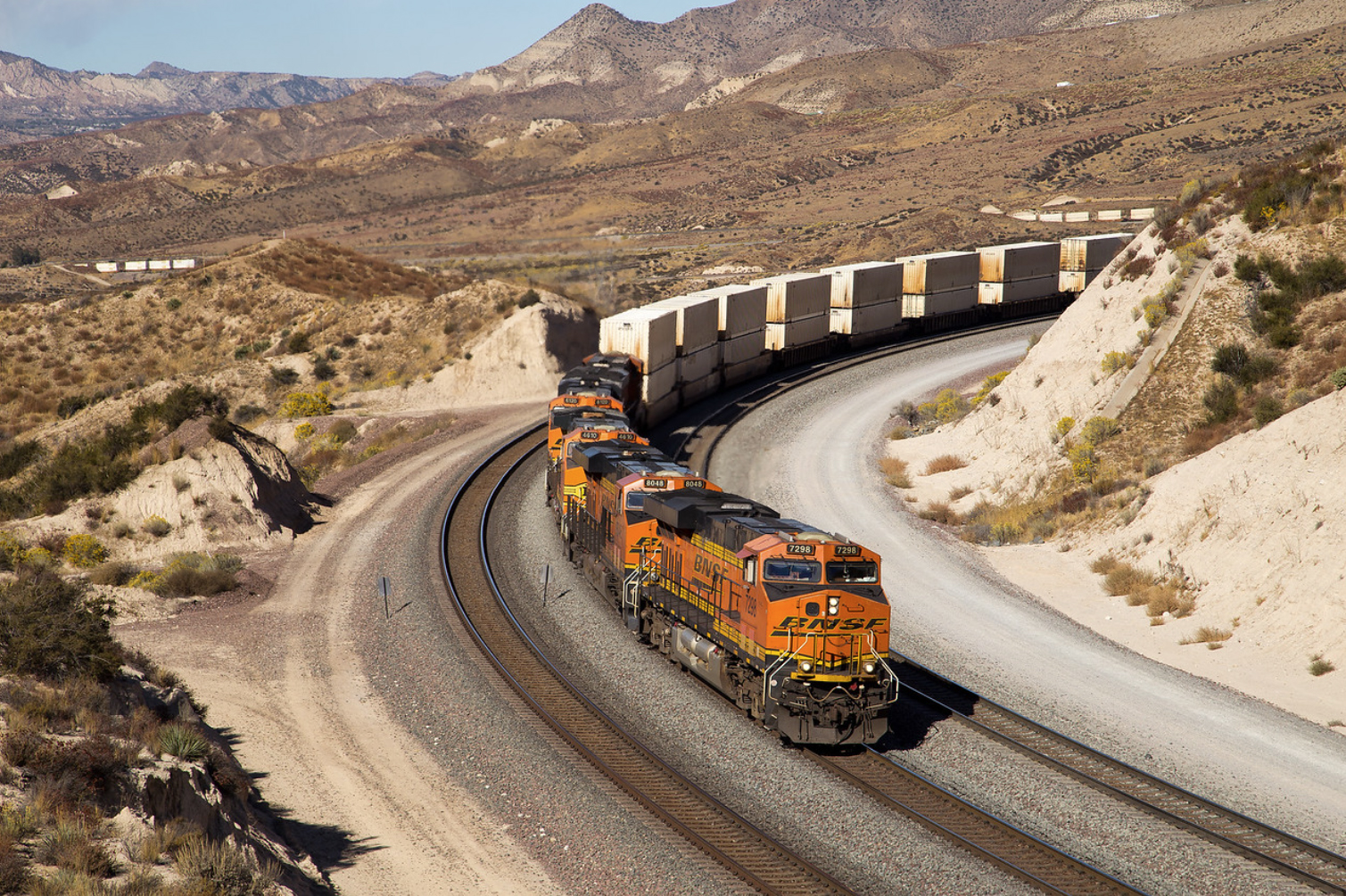 BNSF ES44DC #7298 leads a double-stack intermodal freight over Cajon Pass in California. Loyd Lowry photo.
BNSF ES44DC #7298 leads a double-stack intermodal freight over Cajon Pass in California. Loyd Lowry photo.DC Traction
With the AC4400CW's success, AC traction became the standard in road-switcher production. However, some railroads continued to request DC traction. While not as efficient, it was rugged and had served the industry well since the early 20th century.
For some, the continued use of DC traction was a simply a matter of streamlining maintenance. This was the case at Norfolk Southern and Canadian National, the only two North American Class I's to holdout on AC traction well into the 2000s (the Santa Fe did not purchase the AC4400CW although successor Burlington Northern Santa Fe acquired its first units in 1999).
This sentiment held into the Evolution Series era as only CN, CSX, and BNSF purchased DC traction examples while NS acquired 4,000 horsepower variants (ES40DC).
Norfolk Southern's decision dated back to the "Dash 9" era as the railroad felt such a rating was sufficient for its needs. This changed, however, as trains became heavier and NS acquired its first Es44AC's in 2008.
Data Sheet
| Entered Production | 1/2005 (Burlington Northern #7650) |
| Years Produced | 1/2005 - 10/2010 |
| GE Class | ES44DC |
| Engine | GEVO-12 (12 cylinder) |
| Engine Builder | General Electric |
| Horsepower | 4400 |
| RPM | 1050 |
| Length | 73' 2" |
| Height (Top Of Rail To Top Of Cab) | 15' 5" |
| Width | 10' 3" |
| Weight | 416,000 - 432,000 Lbs |
| Fuel Capacity | 5,000 Gallons |
| Air Compressor | 3CDC (Westinghouse) |
| Air Brake Schedule | 26L (Westinghouse) |
| Trucks | C-C |
| Truck Type | Hi-Ad Bolsterless |
| Truck Wheelbase | 13' 2" |
| Wheel Size | 42" |
| Traction Motors | 752AH (6), GE |
| Traction Alternator | GMG206, GE |
| Auxiliary Alternator | GYA30A, GE |
| MU (Multiple-Unit) | Yes |
| Dynamic Brakes | Yes |
| Gear Ratio | 83:20 |
| Tractive Effort/Starting | 142,000 Lbs |
| Tractive Effort/Continuous | 109,000 Lbs at 13.7 mph |
| Top Speed | 70 mph |
Production Roster
(Total Built = 1,149)
| Owner | Road Number | Serial Number | Order Number | Completion Date | Quantity |
|---|---|---|---|---|---|
| Burlington Northern Santa Fe | 7650-7799 | 55710-55859 | 1986 | 1/2005-7/2005 | 150 |
| CSX Transportation | 5200-5299 | 56046-56145 | 1989 | 7/2005-10/2005 | 100 |
| Burlington Northern Santa Fe | 7605-7649 | 56196-56240 | 1986 | 10/2005-11/2005 | 45 |
| CSX Transportation | 5300-5399 | 56492-56591 | 2004 | 3/2006-6/2006 | 100 |
| Canadian National | 2220-2254 | 56924-56958 | 1997 | 1/2006-2/2006 | 35 |
| Canadian National | 2255-2269 | 56959-56973 | 1997 | 9/2007-10/2007 | 15 |
| CSX Transportation | 5400-5499 | 57736-57835 | 1911 | 1/2007-4/2007 | 100 |
| Burlington Northern Santa Fe | 7505-7604 | 57896-57995 | 1916 | 4/2007-8/2007 | 100 |
| CSX Transportation | 5500-5501 | 58006-58007 | 1911 | 4/2007 | 2 |
| Canadian National | 2270-2289 | 58254-58273 | 1928 | 10/2007-11/2007 | 20 |
| Canadian National | 2290-2309 | 58274-58293 | 1928 | 2/2008-3/2008 | 20 |
| Canadian National | 2310-2344 | 58816-58850 | - | 8/2010-10/2010 | 35 |
| Burlington Northern Santa Fe | 7395-7504 | 59285-59394 | 1942 | 5/2008-10/2008 | 110 |
| Burlington Northern Santa Fe | 7200-7347 | 59744-59891 | 1952 | 1/2009-12/2009 | 148 |
| Burlington Northern Santa Fe | 7348-7394 | 60015-60061 | 1968 | 2/2010 | 45 |
| Burlington Northern Santa Fe | 7800-7920 | 60062-60182 | 1968 | 2/2010-8/2010 | 121 |
Sources
- McDonnell, Greg. Locomotives: The Modern Diesel & Electric Reference, 2nd Edition. Buffalo: Boston Mills Press/Firefly Books, 2015.
- Solomon, Brian. GE and EMD Locomotives: The Illustrated History. Minneapolis: Voyageur Press, 2014.
- Solomon, Brian. GE Locomotives: 110 Years Of General Electric Motive Power. St. Paul: MBI Publishing, 2003.
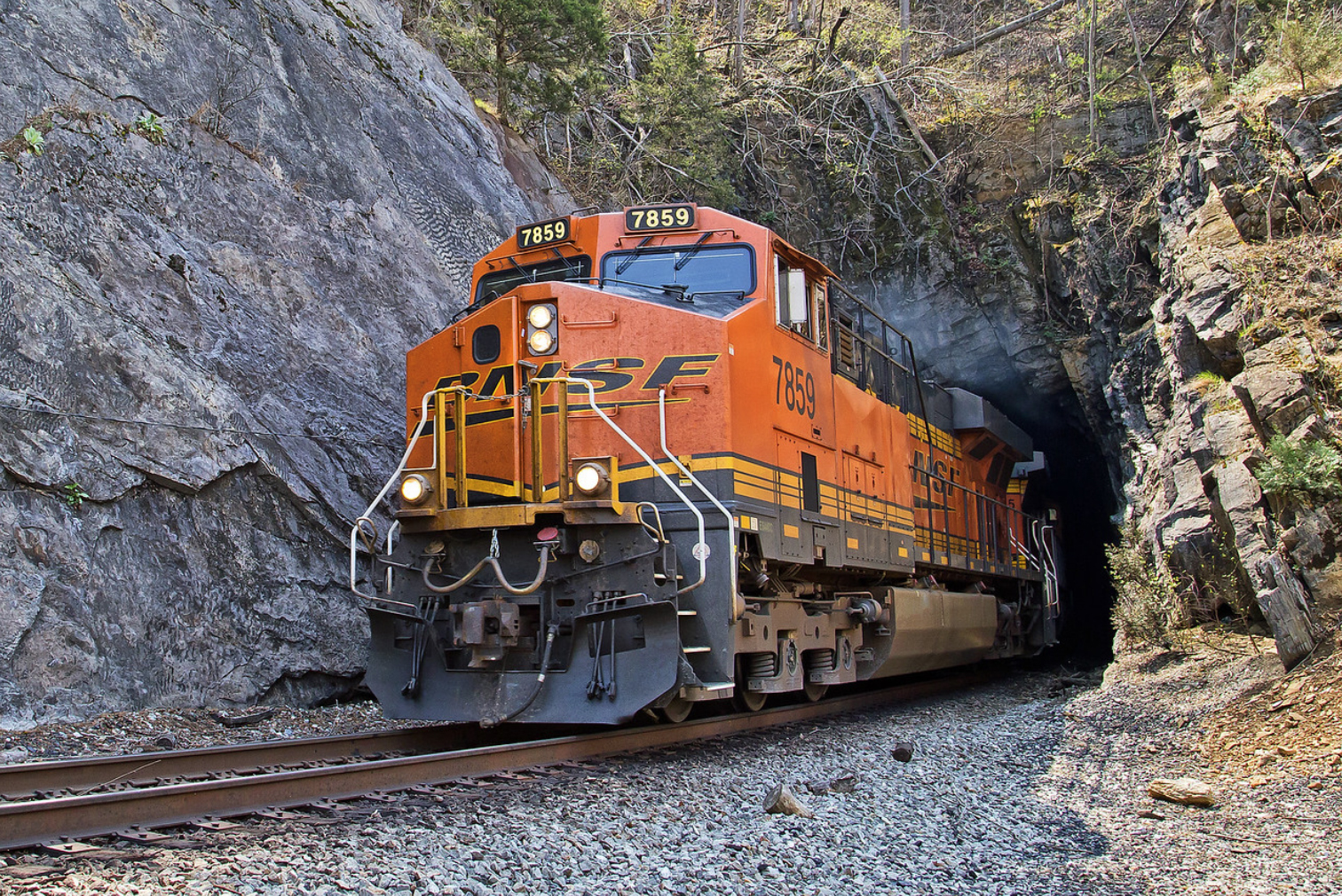 A closeup view of BNSF ES44DC #7859 leading a westbound CSX freight as it exits Bells Tunnel on the James River Subdivision. This tunnel is located west of Buchanan, Virginia and is on a remote stretch of the former C&O main line. Loyd Lowry photo.
A closeup view of BNSF ES44DC #7859 leading a westbound CSX freight as it exits Bells Tunnel on the James River Subdivision. This tunnel is located west of Buchanan, Virginia and is on a remote stretch of the former C&O main line. Loyd Lowry photo.The Evolution Series itself was another breakthrough in locomotive development as builders sought to meet the Environmental Protection Agency's stringent emissions standards that went into affect on January 1, 2005.
GE spent hundreds of millions of dollars designing a new prime mover to meet this requirement and rolled out the first GEVO-powered, 12-cylinder locomotives in 2003.
In the end, the ES44DC sold quite well for GE with more than 1,100 examples produced. Today, nearly all of these locomotives remain in service with their respective railroads.
However, with some now surprisingly over 15 years of age, the next round of new locomotive acquisitions is likely to occur over the next 5-10 years.
Recent Articles
-
Rio Grande 2-8-2 Locomotives (K-37): Specs, Roster, Photos
Apr 15, 25 12:57 PM
Rio Grande's Class K-37 Mikes were itsdge steamers to enter service in the late 1920s. Today, all but two survive. -
Rio Grande 2-8-2 Locomotives (K-36): Specs, Roster, Photos
Apr 15, 25 11:09 AM
The Rio Grande's K-36 2-8-2s were its last new Mikados purchased for narrow-gauge use. Today, all but one survives. -
Rio Grande 2-8-2 Locomotives (Class K-28): Specs, Roster, Photos
Apr 14, 25 10:24 PM
Rio Grande's Class K-28 Mikados were its newest narrow-gauge steam locomotives since the Mudhens of the early 1900s. Today, three survive.
